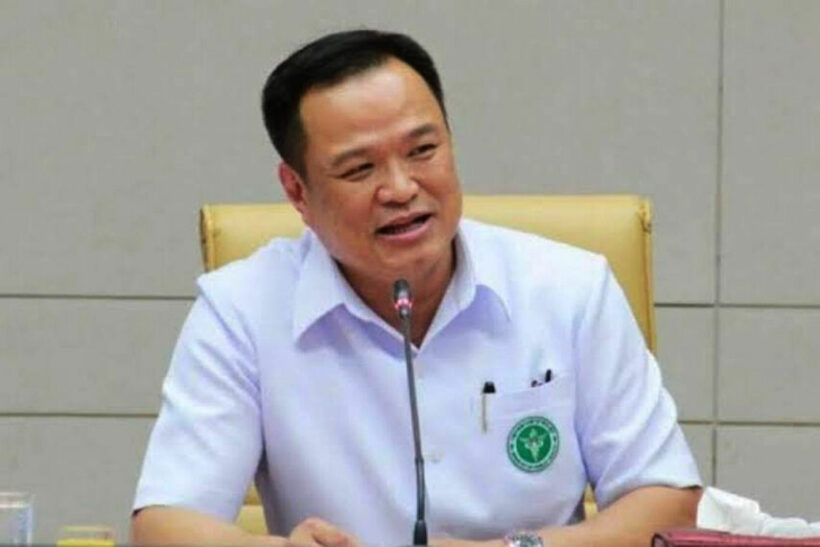Thai Health Minister Anutin Charnvirakul forced to defend his ‘cannabis’ policy

Thailand’s Public Health Minister Anutin Charnvirakul is being backed into a corner by physicians, hundreds of doctors, foundations, universities, and religious groups over his botched decriminalisation of cannabis policy.
Anutin is refusing to back down from the introduction of new laws that decriminalised cannabis on June 6, despite mounting calls for the policy to be suspended amid confusion, misinterpretation, and cases of recent misuse by young Thais.
Anutin defended the current situation claiming that Thai PM Prayut Chan-o-cha had promised to push through a parliamentary bill to clarify confusion, and announce more specific guidelines during the current session.
“A House committee scrutinising the bill on cannabis and hemp is expected to finish work on the bill by the end of next month before presenting it for approval by parliament and royal endorsement.”
Anutin Charnvirakul, also the leader of the Bhumjaithai Party, has staked his political reputation on the reform of Thailand’s cannabis laws which, before June 6, included cannabis and marijuana as an illicit Category 5 drug.
“We cannot step back and make cannabis an illegal drug again. The plant is useful as a form of medical treatment and will benefit the economy.
Yesterday, speaking at a marijuana, spa, and tourism event, he made claims that “regulations are in place to control the use of cannabis”. His claims are incorrect as legislation to clarify specific guidelines, age restrictions, commercial sales, or cultivation are yet to be debated by the Thai parliament.
He even acknowledged at yesterday’s events that the Marijuana Act was yet to be enacted.
Running up to the 2019 general elections, decriminalisation of cannabis was Bhumjaithai’s flagship policy.
Bhumjaithai MPs eventually won an unexpected 51 seats in the 2019 election, becoming a necessary part of the coalition. Without the support of the Bhumjaithai votes, the Palang Pracharat Party wouldn’t have been able to form a government. Anutin secured commitments from Palang Pracharat and the prime minister to back his cannabis reforms before committing the votes of his MPs behind the government.
Responding to questions about his family’s interest or investments in the cannabis industry two weeks ago, Anutin said yesterday that he hadn’t been involved with his family’s ‘hemp’ company for more than 20 years.
“The company belonged to my younger brother and I haven’t met my brother for so long.”
He told Thai media that Sino-Thai used to invest in hemp, but not cannabis. And that the license expired before the new cannabis act was launched.
Anutin’s brother Masthawin Charnvirakul is still a board member of Sino-Thai Engineering Construction. Sino-Thai has won a number of large government engineering contracts including BTS rail lines.
Opposition accusations claim that Anutin’s Sino-Thai Engineering Construction company invested in cannabis businesses before the new cannabis law was launched, alleging that Anutin “decriminalised cannabis for his benefit”.
There has been mounting push-back against the new decriminalisation policy since its introduction with numerous “unintended consequences” emerging without clarification in law for authorities to manage the situation.
The president of the Forensic Physicians Association of Thailand, Smith Srisont, posted on Facebook on Monday.
“…calling for the policy’s immediate suspension because decriminalisation without adequate controls to prevent cannabis use outside of medicinal purposes could hurt young people’s physical and mental development.”
Over 850 doctors and staff at Ramathibodi Hospital are part of a wider national voice of physicians and medical authorities to reverse the decision, saying that there must be adequate controls and guidelines put into law to prevent the abuse of cannabis by young people or a misinterpretation of the decriminalisation law.
Misunderstandings over the current law to decriminalise cannabis have produced a quick uptake of cottage industry retailers and shops selling marijuana and cannabis products. The current lack of legislation leaves the police and authorities with almost no legal power to clamp down on, or control, the situation.
The Education Ministry has also voiced support for the call to suspend the current ‘decriminalisation’ law saying announcements issued by the Public Health Ministry over the use of cannabis were “still unclear”.
SOURCE: Sino-Thai website | Bangkok Post
Latest Thailand News
Follow The Thaiger on Google News:


























